Saturday, May 31, 2008
Vatican, Israel report progress in talks
Monday, May 26, 2008
Memorial Day 2008
"Today is the day we put aside to remember fallen heroes and to pray that no heroes will ever have to die for us again. It's a day of thanks for the valor of others, a day to remember the splendor of America and those of her children who rest in this cemetery and others. It's a day to be with the family and remember."
Ronald Reagan, Memorial Day 1986 |
The muffled drum's sad roll has beat
The soldier's last tattoo;
No more on life's parade shall meet
That brave and fallen few.
On Fame's eternal camping-ground
Their silent tents are spread,
And Glory guards, with solemn round,
The bivouac of the dead.
"Bivouac of the Dead", Theodore O’Hara. |
- Their service came not as a burden but as a duty. The Daily Demarche on the origins of Memorial Day:
In 1918 Moina Michael penned "We Shall Keep the Faith" in response to John McCrae’s "In Flanders Field" (both poems can be found at the end of this post) launching the idea of wearing a poppy on the 30th of May in remembrance of our fallen warriors. While Memorial Day has existed as a federal holiday since only 1966, the practice of honoring America’s war dead dates to at least the Civil War . . .
- "Fallen, But Never Forgotten" - ongoing series at Black Five.
- Legacy.com: In Remembrance - to remember and honor American service members lost in Afghanistan and Iraq. Currently, 3,839 service members are honored on this site.
- Stars and Stripes lists some ways to support servicemembers, with links to many charities and services for our veterans. (See also Blackfive's compilation of groups who work dilligently to support our military personnel in many different and positive ways).
- The Last Doughboy George Will profiles Frank Buckles, the last remaining living veteran of World War I.
- "To Live with Honor" - National Review recognizes Mike Spann, the first American to die on a foreign field of battle in the War on Islamic Terror.
- From Bishop Fulton Sheen's Wartime Prayerbook:
The great French preacher Lacordaire once said the vocation of a soldier is next in dignity to the priesthood, not only because it commissioned him to defend justice on the field of battle and order on the field of peace, but also because it called him to the spirit and intention of sacrifice. Initially compiled during World War II, a new edition of was republished in 2003 by Sophia Institute Press. (Read an excerpt from Sheen's Wartime Prayerbook).
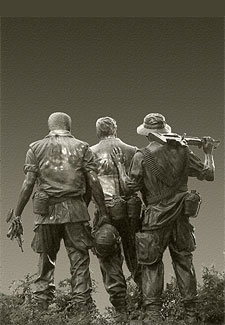
- Bagpipes Cryin' - Based on a poem written by Commander Mark Waddell, as a tribute to the SEALS he lost in the Middle East. Set to music by Tim Rushlow:
"I had three of the four guys on the ground that died that day. I was so heartbroken after I passed out all the flags at the memorial service. I was just thinking about the bagpiper, who is also a retired SEAL captain, standing there literally crying the song out of the bagpipes. We were all so sad. When I came home my wife said I should write down some words. Tim called me and asked how I was doing. I told him I wrote this poem and he said well let me have it. We went back and forth on the phone and decided to make it a tribute to everyone from World War II to the present."
Stumbled across an old green box
in my granddaddy's house
Inside was a cross
some old dog tags
and a picture of when he was shipping out.
So I showed it to him
said "tell me about those days"
When he looked inside
he closed his eyes all he could say was:
"I hear bagpipes cryin' Amazing Grace
Omaha Beach and her crashing waves.
Old Glory draped like Heaven's mercy
over the fallen sons.
I see all the heroes
who were willing to fight in the name of freedom
layin' down their lives.
And prayin' God's grace
would keep us safe from harm
until they brought us boys back home."
Those words to a boy that became a man
now I'm ankle deep in this Persian sand.
And every day I'm giving all I can
because I'm damn proud to be American
Yeah, I made some friends
and I've lost some too
When I think about what they gave for me and you
|
* * *
Today's roundup goes out to all of our brave men and women serving our nation in all branches of our Armed Forces. And especially to my young brother Nathan (US Navy) and to my grandfather, Maas Vanderbilt (U.S. Army).
Almighty God, our heavenly Father, let thy protection be upon all those who are in the service of our country; guard them from all harm and danger of body and soul; sustain and comfort those as home, especially in their hours of loneliness, anxiety, and sorrow; prepare the dying for death and the living for your service; give success to our arms on land and sea and in the air; and grant unto us and all nations a speedy, just and lasting peace. Amen. -- Prayer in Time of WarLabels: civil holidays
Saturday, May 24, 2008
Father Jean Bernard's "Priestblock 25487: A Memoir of Dachau"
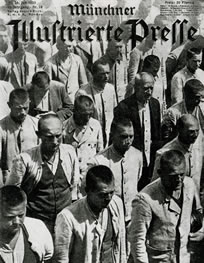 "There is little need to rehearse the conditions of their lives in the camp," says William O'Malley ( The Priests of Dachau, "It was a hell before which Dante would stand mute." A good day was one on which you'd been beaten to your knees only once or twice; one small wad of bread and a cup of watery soup; 12 hours of hard labor, dragging the corpses to the roll call each morning and evening; warehoused at night in tiers, sleeping three to each lice-infested bunk; lugging one's soul from place to place in the fellowship of zombies; the cold, the filth, the endless degrading "hazing", the typhus, the inhuman joy when your best friend was beaten senseless and you were ignored. For some, hell lasted five years of days.
In 1940, it seemed a diplomatic coup that the German bishops and the Vatican had persuaded Heinrich Himmler to concentrate all priests from the network of European camps into one camp, to house them in separate blocks together, with lighter work and a chapel. In early December 1940, priests already interned in Dachau were put into Barracks 26, 28 and 30 at the end of the west side of the long camp street, "Liberty St.". Within two weeks they were joined by 800-900 more from Buchenwald, Mauthausen, Auschwitz and other camps, a Babel of haggard strangers. With the conquest of Western Europe, arrests of priests increased so that, now concentrated into two barracks instead of three, despite the deaths, they were rarely fewer than 1,500 men in beds and toilet facilities built for 360. Hardly any priests remained in the other camps.
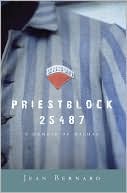 Priestblock 25487 Priestblock 25487 contains the collected memoirs of one such priest from Luxembourg, Fr. Jean Bernard, arrested in 1941 for denouncing the Nazis. He was imprisoned from May 1941 to August 1942.
Initially, the clergy were given "special treatment" -- apparently by request of the Pope: a ration of wine (administered under duress, if necessary); a loaf of bread split between four men; separate bunk accomodations. The celebration of Mass is even tolerated. This segregation has a downside, however -- keeping them in moral isolation and fostering resentment among the ranks.
The "good times" come to an abrupt end in October. Breviaries and rosaries are confiscated; religious activity is prohibited and the clergy are made to join the general workforce. "Some people said that the Pope had given a strong speech on the radio, and the German Bishops had issued a public protest" -- a reminder that under the Nazi regime, outspoken resistance had immediate repercussions on those imprisoned.
From there on out, chapter by chapter, Bernard's situation and that of his fellow priests grows progressively worse. The daily routine of the prisoner is described in harrowing detail. Backbreaking work and the performance of inane tasks, punctuated by arbitrary beatings and punishments meted out by sadistic guards. (Never mind the fate of the prisoners, the condition of the camp itself must be kept pristine in adherence to military order).
Hunger is an ongoing battle -- as the supply of food dwindles, the acquisition of a single turnip, a dandelion, a scrap of cabbage or a seedling plucked from the compost heap is received with celebration. Those too weak to work are admitted to the infirmary, an even more hellish fate as the reader discovers.
Throughout, Fr. Bernard encourages the spirits of his comrades, and at times (coverty) fulfills his priestly functions. There are also moments of striking clarity, where the light of Christian faith and divine grace pierces what seems an eternal night. Two accounts struck me in particular: the first is from early on, when Bernard is imprisoned, shortly after his arrest and awaiting his sentence: My neighbor taps on the wall. "Is it true you are saying Mass? — I'd like to say the responses. Would raise your voice a bit to say the prayers? And please knock three times before the consecration."
As I am performing the sacred rite my cell door opens. Cautiously a guard comes halfway in and looks over at the little altar with an expression that is half sad, half full of longing. "I'm a Catholic," is all he whispers. He stays until he hears footsteps in the corridor.
The second from midway through, Christmas 1941: "I'm on gate duty today," Cappy whispers to me. We are returning from the assembly square on Christmas morning, and our column is marching alongside the German clergy's column for a brief moment.
When it is time to delivery the pails for midday meal I exchange with a colleague assigned to go to Barrack 26 that day. I suspect that Cappy wants to give me something and am eager to find out what it is.
He is standing at the entrance of the barbed-wire barrier around teh barrack, as announced. We are not allowed to enter, but have to leave the pails in front of the "gate." I set mine down next to Cappy, and as he bends down to pick it up he quickly presses a carefully folded piece of paper into my hand. Very softly he mouths the word, "icthys."
I have difficulty concealing my excitement. Swiftly I hide the precious gift in my glove. And as I hurry back home images from the time of the catacombs come to mind. Back then, as now, the Most Holy had to be preserved from desecration, and so the Greek term for "fish", ichthys, became a code word for the Eucharist, since it is composed of the initial letters of the phrase, "Jesus Christ, Son of God, Savior."
After the midday meal, we Luxembourgers met a few friends inconspicuously in the darkness outside the barrack and divided the precious pieces into as many particles as humanly possible. And then the Christ Child entered our hearts ... Priestblock 25487: A Memoir of Dachau is available from Amazon.com. Ignatius Insight has published the first chapter -- definitely worth a read.
* * *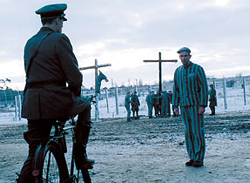 In 2004, The Ninth Day was released -- loosely based on Bernard's memoirs. According to the synopsis: Abbé Kremer is released from a living hell in the Dachau concentration camp and sent home to Luxembourg. Upon his arrival, he soon learns that this is not a reprieve or a pardon of his crime – voicing opposition to the Nazis’ racial laws – but that he has nine days to convince the bishop of Luxembourg to work with the Nazi occupiers. Gestapo Untersturmführer Gebhardt is under pressure from his superior to have the Abbé succeed in creating a rift between the Luxembourg church and the Vatican – or be transferred to duty in the death camps in the East. Gebhardt, a former Catholic seminarian, uses theological arguments to bring the Abbé around but when they don’t work he resorts to more draconian measures. The Abbé is torn between his conscience and his horror of returning to Dachau...
Some clarification: Bernard's account of his leave in the book is much different than that of the film. This is not to say that Bernard isn't faced with the option of saving himself, fleeing or returning to camp of his own volition (avoiding repercussions to his fellow prisoners); or that he isn't grilled during an obligatory meeting at Gestapo headquarters about the status of his "re-education" (a great propaganda success, were it to be achieved) -- only that he is granted his suprise leave for a different reason, which I'll leave to the reader to discover.
Related
Priestblock 25487: A Memoir of Dachau
- Priestblock 25487: A Memoir of Dachau - Publisher's info. The book features an Introduction by Robert Royal, and a Preface by Archbishop O’Malley. Noted translator Deborah Lucas Schneider (From The Wehrmacht: History, Myth, Reality; Germany: A New History) was commissioned by Zaccheus Press to prepare the first English-language translation.
The Ninth Day
- Review: The Ninth Day, by Steven D. Greydanus (Decentfilms.com).
- Interview with The Ninth Day's director, Volker Schlondorff:
The Ninth Day comes right on the heels of another German Nazi-themed film, Downfall, in which Schlöndorff’s star, Ulrich Matthes, plays the diametrically opposite role of Nazi propagandist Joseph Göebbels. Which role did he play first, and what was this like for him?
"We were shooting more or less simultaneously. [Matthes’s] part [in Downfall] was finished [while we were shooting], but then they were still doing all the war scenes and stuff, what happened on the surface, not what happened in the bunker, but all the streetfighting and stuff. They were still shooting that…
"So [to play the priest] was to exorcise, to get the Göebbels out of his system. He said it was much harder and more painful to do the Göebbels, and it was a great relief to do the priest after that."
See also:
Labels: books
Tuesday, May 20, 2008
... Henri de Lubac’s most important contribution to Catholic theology was a sustained analysis of the relation between nature and grace. In the 1930s he argued that standard theologies of the neoscholastic tradition used a metaphysically rigid, dualistic account of human destiny that ironically confirmed rather than overcame the modern suspicion that our everyday lives and concerns (nature) have no intrinsic contact with or need for the life of faith (grace). Instead of overcoming the dualisms that have tended to drive modern thought and life toward contrastive and fruitless antinomies, neoscholasticism unwittingly absorbed the tendency into itself.
When de Lubac claimed that the fundamental structure of neoscholasticism was a covert form of modernism, he was making a direct attack on the modes of theology that dominated the Church in the first half of the twentieth century. Not surprisingly, he became a suspect character in the eyes of church authorities. In the 1950s he was silenced by his superiors in the Society of Jesus.
One would think that, as a result, de Lubac would have embraced the spirit of innovation that flourished after Vatican II. He did not. Near the end of his life he wrote a small and bitter book, A Brief Catechesis on Nature and Grace . In its pages he sought to address what he regarded as a fundamental misunderstanding of his basic insights, and its main thrust is a defense of the core theological judgments of the neoscholastic tradition he spent his life criticizing. . In its pages he sought to address what he regarded as a fundamental misunderstanding of his basic insights, and its main thrust is a defense of the core theological judgments of the neoscholastic tradition he spent his life criticizing.
The message is clear: Readers cannot understand Henri de Lubac’s theology of nature and grace unless they know and accept the basic outlines of classical Thomistic theology. Thus the paradox, once again. By the 1980s, Henri de Lubac, the great critic of dry and dusty neoscholasticism, saw that the younger generation needed to be catechized into the standard, baseline commitments of Catholic theology. Ressourcement does not work if students have neither context nor framework in which to place the richness and depth of the tradition. R.R. Reno, "Theology afer the Revolution" First Things May 2007 (review of Fergus Kerr's Twentieth Century Catholic Theologians ). ). Labels: books, theology
Tuesday, May 13, 2008
DarwinCatholic on "A Pro-Choice Catholic I could Support"
"A Pro Choice Politician I could Support", by DarwinCatholic: I think it essentially goes without saying (though not quite, which is why I'm saying it) that there are situations in which a Catholic would in good conscience vote for a pro-choice politician despite that politicians pro-choice stance. The USCCB in its document "Forming Consciences for Faithful Citizenship" repeats a traditional understanding of how one may vote for a politician who supports certain evils if one disagrees with those positions, and if one holds that there are sufficiently grave considerations which cause one to believe that it is most to the common good to elect that politician despite his holding some objectively evil beliefs.
However, it seems to me that in discussing the upcoming election, several Catholics in public and intellectual life (Douglas Kmiec very much among them) have attempted to make the case that one should support Obama not despite his stand on abortion, but rather because an Obama administration will be able to make progress towards a more truly pro-life society in a way that recent Republican administrations have not been able to. I disagree with people who take the former position, though I can certainly respect them, but I take serious objection to those who take the latter, and this post is intended to address them. ... Must-read post of the day.
Irena Sendler 1910-2008: "Righteous Among the Nations"
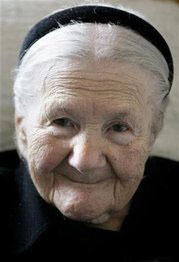
The face of a guardian angel - Irena Sendler 1910-2008 |
Irena Sendler, Lifeline to Young Jews, Is Dead at 98 New York Times May 13, 2008: Irena Sendler, a Roman Catholic who created a network of rescuers in Poland who smuggled about 2,500 Jewish children out of the Warsaw ghetto in World War II, some of them in coffins, died Monday in Warsaw. She was 98.
The death was confirmed by Stanlee Stahl, executive vice president of the Jewish Foundation for the Righteous, an organization that supports rescuers of Holocaust victims.
Mrs. Sendler was head of the children’s bureau of Zegota, an underground organization set up to save Jews after the Nazis invaded Poland on Sept. 1, 1939. Soon after the invasion, approximately 450,000 Jews, about 30 percent of Warsaw’s population, were crammed into a tiny section of the city and barricaded behind seven-foot-high walls.
On April 19, 1943, the Nazis began what they expected would be a rapid liquidation of the ghetto. It took them more than a month to quell the Warsaw ghetto uprising. By then, only about 55,000 Jews were still alive; most of them were sent to death camps.
Also by then, however, Mrs. Sendler’s group of about 30 volunteers, mostly women, had managed to slip hundreds of infants, young children and teenagers to safety.
“She was the inspiration and the prime mover for the whole network that saved those 2,500 Jewish children,” Debórah Dwork, the Rose professor of Holocaust history at Clark University in Massachusetts, said Monday. Professor Dwork, the author of “Children With a Star” (Yale University Press, 1991), said about 400 children had been directly smuggled out by Mrs. Sendler. ...
The Wikipedia entry has further details: In December 1942, the newly created, the newly created Children's Section of the Żegota (Council for Aid to Jews), nominated her (under her cover name Jolanta) to head its children's department. As an employee of the Social Welfare Department, she had a special permit to enter the Warsaw Ghetto, to check for signs of typhus, something the Nazis feared would spread beyond the ghetto. During the visits, she wore a Star of David as a sign of solidarity with the Jewish people and so as not to call attention to herself.
[Sendler] cooperated with the Children's Section of the Municipal Administration, linked with the RGO (Central Welfare Council), a Polish Relief Organization tolerated under German supervision. She organized the smuggling of Jewish children from the Ghetto, carrying them out in boxes, suitcases and trolleys. The children were placed with Polish families, the Warsaw orphanage of the Sisters of the Family of Mary or Roman Catholic convents such as the Sisters Little Servants of the Immaculate Conception of the Blessed Mary at Turkowice and Chotomów. Some were smuggled to priests in parish rectories where they could be further hidden. She kept lists of the names, hidden in jars, in order to keep track of their original and new identities.
Arrested in 1943 by the Gestapo, she was severely tortured and sentenced to death. The Żegota saved her by bribing the German guards on the way to her execution. She was left in the woods, unconscious and with broken arms and legs. Officially, she was listed on public bulletin boards as among those executed. Even in hiding, she continued her work for the Jewish children.
Related
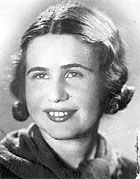 Life in a Jar: The Irena Sendler Project - a website by rural Kansas school students who -- initially skeptical about the claim to have saved 2,500 children -- started a research project: Life in a Jar: The Irena Sendler Project - a website by rural Kansas school students who -- initially skeptical about the claim to have saved 2,500 children -- started a research project:They found that Irena Sendler, as a non-Jewish social worker, had gone into the Warsaw Ghetto, talked Jewish parents and grandparents out of their children, rightly saying that all were going to die in the Ghetto or in death camps, taking the children past the Nazi guards (in body bags, saying they were ill, or using one of the many means of escape from the Ghetto-the old courthouse for example), and then adopting them into the homes of Polish families or hiding them in convents and orphanages. She made lists of the children's real names and put the lists in jars, then buried the jars in a garden, so that someday she could dig up the jars and find the children to tell them of their real identify.
The Nazi's captured her and she was beaten severely, but the Polish underground bribed a guard to release her, and she entered into hiding. The students wrote a performance (Life in a Jar) in which they portrayed the life of Irena Sendler. They have performed this program for numerous clubs and civic groups in the community, around the state of Kansas, all over the U.S. and in Europe (225 presentations as of November 2007). The community of Uniontown has little diversity and no Jewish students in the school district. The community was inspired by the project and sponsored an Irena Sendler Day. The students began to search for the final resting place of Irena and discovered she was still alive and living in Warsaw, Poland. Irena's story was unknown world-wide, even though she has received esteemed recognition from Yad Vashem in the 1960's and support from the Jewish Foundation for the Righteous in New York City. Forty-five years of communism had buried her story, even in her own country.
From that time on they would take a jar to every performance and collect fund for Irena and other Polish rescuers. ...
- A TV movie about the life of Holocaust hero Irena Sendler is being readied for production and will air next season on CBS:
"The Irena Sendler Story" is based on an authorized biography of the woman credited with rescuing some 2,500 Jewish children from the Nazis by smuggling them out of the Warsaw Ghetto, producer Hallmark Hall of Fame said Monday. ...John Kent Harrison, who became familiar with Sendler's bravery while in Poland three years ago filming a CBS miniseries about Pope John Paul II, wrote the script for the Sendler film and will direct.
The movie is drawn from the 2005 book "Mother of the Children of the Holocaust: The Irena Sendler Story," written by Anna Mieszkowska.
- I'm no hero, says woman who saved 2,500 ghetto children The Guardian March 15, 2007:
Mrs Sendlerowa, who is in a Warsaw nursing home, insisted she did nothing special.
In an interview she said: "I was brought up to believe that a person must be rescued when drowning, regardless of religion and nationality."
"The term 'hero' irritates me greatly. The opposite is true. I continue to have pangs of conscience that I did so little."
- Irena Sendler Tribute by Yad Vashem ("The Righeous Among the Nations").
Monday, May 12, 2008
Prayer Request for Dale Price
Prayer request for Dale Price ( Dyspeptic Mutterings): He woke up with what he thought was indigestion or heartburn but it didn't get better. His first EKG came back fine, but they're keeping him until tomorrow morning (at least) to do a stress test then.
I know you and at least most of your readers are the praying type; that would be great. Thanks,
Heather Price
Update
Heather has an update (Domestic Bliss Report): They're doing regular blood draws to check things; those keep coming back with good results. His spirits are good despite being on bedrest--I remember that from last year!
The kids and I saw him and they're okay. Madeleine told him she'd rather he be in the hospital and get better than home sick, so she's a smart girl. He encouraged us to go to dance class, even.
The cardiologist has said he expects Dale to get released by 5 PM Tuesday. Not a moment too soon.
Update
Dale's back home! May 14, 2008. Labels: prayer requests
Sunday, May 11, 2008
Feast of Pentecost - 2008
We read in the Acts of the Apostles that the disciples were gathered together in prayer in the Cenacle when the Holy Spirit descended upon them with power like wind and fire. They then began to proclaim the glad tidings of Christ's resurrection in many languages (cf. Acts 2:1-4). That was the "baptism in the Holy Spirit," which had already been announced by John the Baptist: "I have baptized you with water," he said to the crowds, "but he who comes after me is more powerful than me. (...) He will baptize you in the Holy Spirit" (Matthew 3:11).
In effect, Jesus' whole mission was aimed at giving the Spirit of God to men and baptizing them in the "bath" of regeneration. This was realized through his glorification (cf. John 7:39), that is, through his death and resurrection: Then the Spirit of God was poured out in a super-abundant way, like a waterfall able to purify every heart, to extinguish the flames of evil and ignite the fire of divine love in the world.
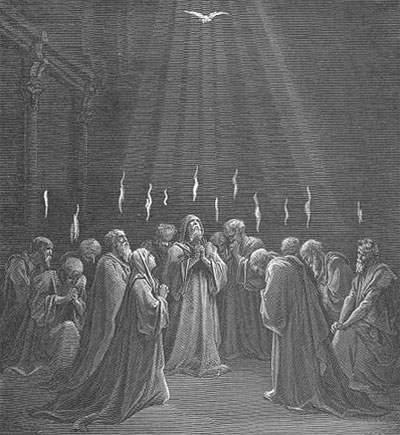
The Acts of the Apostles present Pentecost as a fulfillment of such a promise and therefore as the crowning moment of Jesus' whole mission. After his resurrection, he himself ordered his disciples to stay in Jerusalem, because, he said, "In a short time you will be baptized in the Holy Spirit" (Acts 1:8); and he added: "You will have the power of the Holy Spirit, who will descend upon you and you will be my witnesses in Jerusalem, in all of Galilee and Samaria unto the ends of the earth" (Acts 1:8).
Pentecost is, thus, in a special way, the baptism of the Church who undertakes her universal mission beginning from the streets of Jerusalem with prodigious preaching in the different languages of humanity. In this baptism of the Holy Spirit the personal and communal dimensions -- the "I" of the disciple and the "we" of the Church -- are inseparable. The Spirit consecrates the person and at the same time makes him a living member of the mystical body of Christ, participant in the mission to witness to his love.
And this is actualized through the sacraments of Christian initiation: baptism and confirmation. In my message for World Youth Day 2008, I invited young people to rediscover the presence of the Holy Spirit in their lives and, therefore, the importance of these sacraments. Today I would like to extend this invitation to everyone: Let us rediscover, dear brothers and sisters, the beauty of being baptized in the Holy Spirit; let us be aware again of our baptism and of our confirmation, sources of grace that are always present.
Let us ask the Virgin Mary to obtain a renewed Pentecost for the Church again today, a Pentecost that will spread in everyone the joy of living and witnessing to the Gospel.
Pope Benedict XVI, on the Solemnity of Pentecost May 11, 2008
Thursday, May 08, 2008
Well, I for one welcome our Puppet Overlords ...
A "Salute" to Archbishop Timothy Paul Broglio
 By way of some grumbling from Commonweal magazine about the "military-ecclesiastical complex" we get a link to Salute: The magazine for the Archdiocese of the Military Services, USA [PDF format].
The current issue features special Coverage of the Installation of Archbishop Broglio -- interviews with the Archbishop, his family and friends; the Archbishop’s homily for the Mass of Installation.
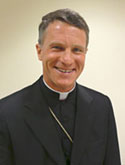 The interview with Archbishop Broglio is particularly fascinating, as he tells of his background as Secretary of the Apostolic Nunciatures in Côte d’Ivoire (West Africa, 1983-87) and in Paraguay (1987-90), followed by an eleven year stint with Cardinal Angelo Sodano in the Vatican ("he confirmed for me that authentic ministry in the Church is not about honors or positions, but service"): The interview with Archbishop Broglio is particularly fascinating, as he tells of his background as Secretary of the Apostolic Nunciatures in Côte d’Ivoire (West Africa, 1983-87) and in Paraguay (1987-90), followed by an eleven year stint with Cardinal Angelo Sodano in the Vatican ("he confirmed for me that authentic ministry in the Church is not about honors or positions, but service"):
AMS: You certainly have had extensive experience in dealing with all kinds of people and all kinds of situations, hard ones too, around the world, from the highest level of the Church, to some of the poorest parishes of the Church. How has this prepared you for this new assignment? The Military Archdiocese, after all, is a perfect example of the “global Church.” What are your goals?
AB: The Holy See has decided to give me another challenge. When I was first approached with the proposal of being named Archbishop for the Military Services in the United States, I was overwhelmed. I really am not sure exactly how I responded, but knew that, if asked, I would accept.
That afternoon, Divine Providence arranged that I accompany two young Puerto Rican priests to the Rooms of St. Ignatius in Rome. Privately, while there, I repeated Ignatius’ prayer “Take, Lord, my liberty, my understanding, my entire will. Give me only your grace which will be enough for me.” Once again, I placed my ministry in the hands of Almighty God.
As I learn more about the AMS, I am convinced that I can offer my talents and make a contribution. While the situation and the characteristics change for military personnel and their families, our ministry is still basically pastoral. I bring thirty-two years of ordained ministry to these new responsibilities, but more importantly the conviction that Jesus Christ established His Church as
the instrument for the salvation of humanity. “Woe to me, if I do not preach the Gospel,” St. Paul tells us. My first goal is to facilitate the ministry of our chaplains and thereby minister to the military and their families. ...
Also of note is an article entitled "Christ in the Combat Zone" -- a Chaplain reporting on his second tour to Iraq.
Thursday, May 01, 2008
The Vatican, The Anbar Awakening and the "Protector of the Chaldean Catholics"
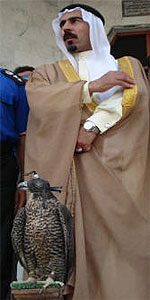 A quick recap: In September 2006, Sheikh Abdul-Sattar Abu Risha formed the Sunni Anbar Awakening, an alliance of tribes in the Anbar province, to counter -- with training by and cooperation with U.S. military -- the presence of Al Qaeda and other terrorist organizations. “I swear to God, if we have good weapons, if we have good vehicles, if we have good support, I can fight Al Qaeda all the way to Afghanistan,” he was reported to have said ( "An Iraqi Tribal Chief Opposes the Jihadists, and Prays" March 3, 2007).
As Steve Schippert noted at the time, most Americans were oblivious to Sattar's contributions to the counter-terrorist effort ("This Is Counterterrorism, Senator" National Review April 25, 2007): The most significant local ally of Coalition and Iraqi government in Anbar province — and surely in all of Iraq — is Sheikh Abdul Sattar Buzaigh al-Rishawi, or, more properly, Sheikh Abd al-Sattar, where “Abd” translates into “slave” or “totally subordinated” (to God, of course). Sheikh Abdul Sattar is instrumental in fighting and defeating al Qaeda; the incredibly influential Ramadi man sees al Qaeda as terrorists who seek to destroy his country and who are exploiting and murdering his people, Sunni and Shia alike. Al Qaeda wants him dead more than any other man in Iraq, and they have tried numerous times to kill him.
Sattar said recently, “The time for dictatorship is gone, and we are welcoming the new dawn of democracy and freedom here.” He is a powerful Sunni from Anbar province, and, on Iraqi national television, he has pledged his allegiance to Prime Minister al-Maliki — a Shia — and to the democratically elected Iraqi government. In an overt (and televised) gesture of his determination and solidarity with the Iraqi government, Sheikh Abdul Sattar sliced the palm of his hand with a knife and proceeded to pound the blade into the table before him.
The perceived civil war in Iraq is in many ways more a product of foreign Iranian and al Qaeda instigation than internal Iraqi hatred. Had al Qaeda not bombed the Shia al-Askari Mosque and had Iran not provided arms and funds to both sides of the ensuing sectarian killings, there is no telling where Iraq would be right now. It certainly was not in civil war then. Both Iran and al Qaeda require chaos and instability in order to achieve their aims in Iraq. Sattar’s mission is to foil their plans.
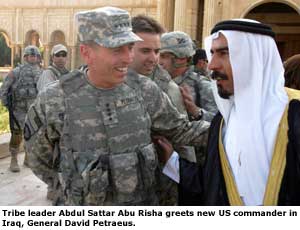 Part and parcel of the Anbar Awakening's success was the tribal alliance's ability to work cooperatively with Americans -- according to Col. Sean B. MacFarland of the 1st Brigade Combat Team, 1st Armored Division: “If you talk to these sheiks, they’ll tell you that they’re in no hurry to see the Americans leave al-Anbar."
“One thing Sheikh Sattar keeps saying is he wants al-Anbar to be like Germany and Japan and South Korea were after their respective wars, with a long-term American presence helping ... put them back together,” MacFarland said. “The negative example he cites is Vietnam. He says, yeah, so, Vietnam beat the Americans, and what did it get them? You know, 30 years later, they’re still living in poverty.”
In fact, over the course of 9 months, the Sahwah Al Anbar, or " Anbar Salvation Council", was able to expel Al Qaeda from Ramadi (once an insurgent stronghold and the capital of Al Qaeda operations) and the Anbar province in general -- a victory which he dedicated to the victims of 9/11: "In the month when the terrorists attacked the Twin Towers of the World Trade Center, we dedicate the victory of Anbar Province to the families of the victims who suffered that criminal act," the letter said, which was addressed directly to Bush.
"With the help of the president of the United States, we pledge to continue to cooperate and communicate with you to continue to get good results," the letter said.
On September 13, 2007, al-Rishawi was killed along with two of his bodyguards by a roadside bomb near his home in Ramadi, Anbar, Iraq -- 10 days after meeting President George W. Bush at a U.S. base in Anbar. Sheikh Ahmed was selected by his fellow Sheikhs of Anbar province to lead the Sahawa Al Anbar and carry on his brother's legacy ("Iraqis vow to fight al Qaeda after sheikh death" Reuters Sept. 14, 2007).
* * *
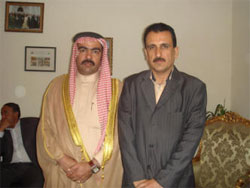 This week, a friend forwarded me the following news story from the Arab press: A letter from Pope Benedict XVI to Sheik Ahmed Abu Risha (SahwataliIraq.com). This week, a friend forwarded me the following news story from the Arab press: A letter from Pope Benedict XVI to Sheik Ahmed Abu Risha (SahwataliIraq.com).
The article is in Arabic, but the gist of it is that on April 28, 2008, Sheikh Ahmed Abu Risha, President of the revival in Iraq in his official headquarters in the city of Ramadi, met Sheikh Iyad George Aziz, a major leader within the Chaldean Catholic community.
The article references a letter from the Vatican to Sheik Ahmed (delivered to him by Sheikh Iyad), responding to his Christmas and New Year's greetings and expressing the positive desire to join the Muslim-Christian dialogue. The full text of the Vatican's letter:
From the Vatican March 4, 2008
Dear Sheikh Ahmed Basi' Abu Risha,
His Holiness Pope Benedict XVI was pleased to receive the Christmas and New Year's message which you sent to him, and has asked me to thank you. He appreciates the sentiment which has prompted you to write him.
In his message for the 2008 World Day of Peace, His Holiness extended an invitation "for every man and woman to have a more lively sense of belonging to the one human family, and to strive to make human coexistence increasingly reflect this conviction, which is essential for the establishment of true and lasting peace." With these sentiments, His Holiness encourages you and all men and women of goodwill in your efforts to promote harmony and reconciliation throughout your region.
With assurance of my prayers and good wishes, I am yours sincerely,
Archbishop Fernando Filoni
* * *
As readers are no doubt aware, by virtue of their Christian faith, the Chaldeans have been subject to horrible persecution, the imposition of jaziyah, kidnappings and even targeted assassinations by Al Qaeda in Iraq.
As my source reports, Sheikh Iyad has apparently agreed to join the Sahawa [Awakening], allowing Sheikh Ahmad to add "Protector of the Chaldean Catholics" to his list of formal titles in a public ceremony covered by Arab media: After hearing Sheikh Iyad's account of the suffering that the Chaldean Catholics have endured in Iraq, Sheikh Ahmad publicly declared that from this time forward they would be under his protection, that anyone who killed a Chaldean will be regarded as one who has killed in a member of his tribe (under the medieval Islamic concept of qisas this is a capital offense), and money will be provided from the Sahawa al-Iraq treasury to rebuild the churches and cemeteries that al-Qaeda destroyed. He justified this by quoting from the Qu'ran and stating that there should be no compulsion in matters of religion because truth stands free from error.
Consequently, in a moment of Muslim-Christian solidarity, it would appear that the Chaldeans have a new and very significant protector from persecution at the hands of Al Qaeda.
Related Reading
- "Ramadi from the Caliphate to Capitalism", by Andrew Lubin. Proceedings Magazine Issue: April 2008 Vol. 134/4/1,262 provides an detailed look at how Sheikh Sattar Abdul Abu Risha and his Sons of Anbar, together with the assistance of the U.S. Army's 1st Brigade Combat Team (BCT) and the 1st Battalion, 6th Marines, turned around a city once regarded as "a lost cause" and proclaimed by Al Qaeda as the capital of their new caliphate.
- Hope for Iraq’s Meanest City How the surge brought order to Fallujah, by Michael Totten City Journal Vol. 18, No. 2 Spring 2008:
The results of the Anbar Awakening and the surge are plain to see. Since the Fifth Marine Regiment’s Third Battalion rotated into Fallujah in September 2007, not a single American has been wounded there, let alone killed. ...
“The al-Qaida leadership outside dumped huge amounts of money and people and arms into Anbar Province,” says Lieutenant Colonel Mike Silverman, who oversees an area just north of Ramadi. “They poured everything they had into this place. The battle against Americans in Anbar became their most important fight in the world. And they lost.” (Michael Totten blogs regularly at Michael Totten's Middle East Journal).
- Sons of Iraq Screened for ISF, by Spc. Amanda McBride. Multi-National Force Iraq Sunday, 13 April 2008. The "Sons of Iraq" (two thirds of them Sunni, one-third Shia -- formerly "Concerned Citizens Groups") are being transitioned to formal membership in the Iraqi Security Forces:
“There is a phenomenal interest in the ISF,” said Getchell, a native of Bridgewater, Mass. “Those who have been in the Sons of Iraq program are our priority over those who are not part of the Sons of Iraq program. They stepped forward to defend and protect their areas, so they’ve already shown the propensity to be part of the security process.” In March, Soldiers of the 2nd Brigade Combat Team, 3rd Infantry Division and Sons of Iraq conducted a combined medical engagement in Arab Jabour, treating residents for minor injuries, such as scrapes, sprains and allergies.
Labels: iraq, islam
|
From the new blog

|

 "There is little need to rehearse the conditions of their lives in the camp," says William O'Malley (The Priests of Dachau, "It was a hell before which Dante would stand mute."
"There is little need to rehearse the conditions of their lives in the camp," says William O'Malley (The Priests of Dachau, "It was a hell before which Dante would stand mute." Priestblock 25487 contains the collected memoirs of one such priest from Luxembourg, Fr. Jean Bernard, arrested in 1941 for denouncing the Nazis. He was imprisoned from May 1941 to August 1942.
Priestblock 25487 contains the collected memoirs of one such priest from Luxembourg, Fr. Jean Bernard, arrested in 1941 for denouncing the Nazis. He was imprisoned from May 1941 to August 1942.

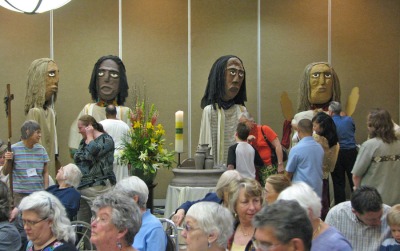
 By way of some grumbling from Commonweal magazine about the "military-ecclesiastical complex" we get a link to Salute: The magazine for the Archdiocese of the Military Services, USA [PDF format].
By way of some grumbling from Commonweal magazine about the "military-ecclesiastical complex" we get a link to Salute: The magazine for the Archdiocese of the Military Services, USA [PDF format].
 A quick recap: In September 2006, Sheikh Abdul-Sattar Abu Risha formed the Sunni Anbar Awakening, an alliance of tribes in the Anbar province, to counter -- with training by and cooperation with U.S. military -- the presence of Al Qaeda and other terrorist organizations. “I swear to God, if we have good weapons, if we have good vehicles, if we have good support, I can fight Al Qaeda all the way to Afghanistan,” he was reported to have said ("An Iraqi Tribal Chief Opposes the Jihadists, and Prays" March 3, 2007).
A quick recap: In September 2006, Sheikh Abdul-Sattar Abu Risha formed the Sunni Anbar Awakening, an alliance of tribes in the Anbar province, to counter -- with training by and cooperation with U.S. military -- the presence of Al Qaeda and other terrorist organizations. “I swear to God, if we have good weapons, if we have good vehicles, if we have good support, I can fight Al Qaeda all the way to Afghanistan,” he was reported to have said ("An Iraqi Tribal Chief Opposes the Jihadists, and Prays" March 3, 2007).
 Part and parcel of the Anbar Awakening's success was the tribal alliance's ability to work cooperatively with Americans -- according to Col. Sean B. MacFarland of the 1st Brigade Combat Team, 1st Armored Division:
Part and parcel of the Anbar Awakening's success was the tribal alliance's ability to work cooperatively with Americans -- according to Col. Sean B. MacFarland of the 1st Brigade Combat Team, 1st Armored Division:





 The interview with Archbishop Broglio is particularly fascinating, as he tells of his background as Secretary of the Apostolic Nunciatures in Côte d’Ivoire (West Africa, 1983-87) and in Paraguay (1987-90), followed by an eleven year stint with Cardinal Angelo Sodano in the Vatican ("he confirmed for me that authentic ministry in the Church is not about honors or positions, but service"):
The interview with Archbishop Broglio is particularly fascinating, as he tells of his background as Secretary of the Apostolic Nunciatures in Côte d’Ivoire (West Africa, 1983-87) and in Paraguay (1987-90), followed by an eleven year stint with Cardinal Angelo Sodano in the Vatican ("he confirmed for me that authentic ministry in the Church is not about honors or positions, but service"): This week, a friend forwarded me the following news story from the Arab press:
This week, a friend forwarded me the following news story from the Arab press: 












